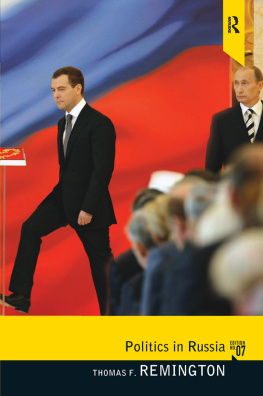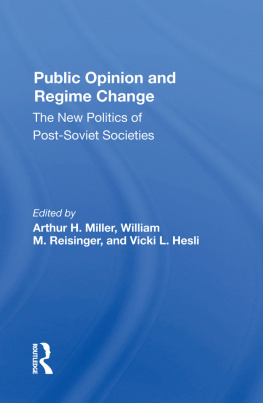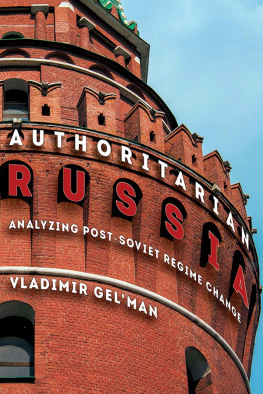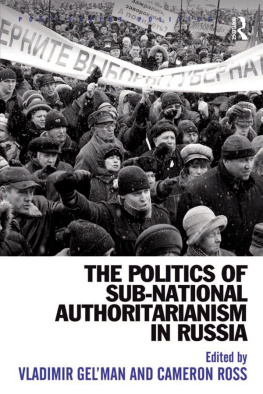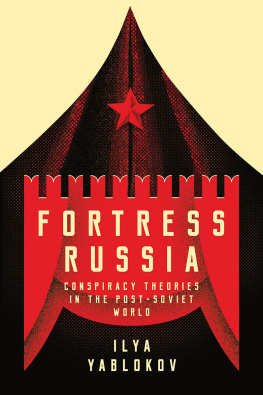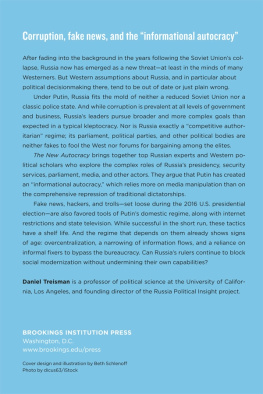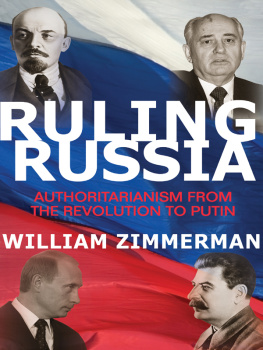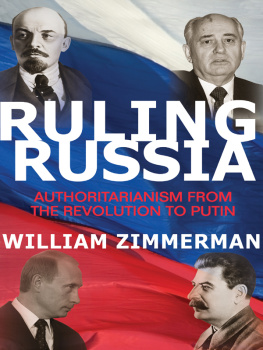Politics in Russia
Seventh Edition
THOMAS F. Remington
Emory University
First published 2012, 2010, 2008 by Pearson Education, Inc.
Published 2016 by Routledge
2 Park Square, Milton Park, Abingdon, Oxon OX14 4RN
711 Third Avenue, New York, NY 10017, USA
Routledge is an imprint of the Taylor & Francis Group, an informa business
Copyright 2012, 2010, 2008 Taylor & Francis. All rights reserved.
All rights reserved. No part of this book may be reprinted or reproduced or utilised in any form or by any electronic, mechanical, or other means, now known or hereafter invented, including photocopying and recording, or in any information storage or retrieval system, without permission in writing from the publishers.
Notice:
Product or corporate names may be trademarks or registered trademarks, and are used only for identification and explanation without intent to infringe.
Credits and acknowledgments borrowed from other sources and reproduced, with permission, in this textbook appear on appropriate page within text.
ISBN: 9780205005796 (pbk)
Cover Designer: Suzanne Behnke
Library of Congress Cataloging-in-Publication Data
Remington, Thomas F.
Politics in Russia / Thomas F. Remington 7th ed.
p. cm.
Includes bibliographical references and index.
ISBN-13: 978-0-205-00579-6 (alk. paper)
ISBN-10: 0-205-00579-9 (alk. paper)
1. Russia (Federation)Politics and government1991 2. Constitutional historyRussia (Federation) 3. Soviet UnionPolitics and government. I. Title.
JN6695.R46 2012
320.947dc22
2010041647
BRIEF CONTENTS
Contents
CONTENTS
The image on the cover shows Russian president Dmitrii Medvedev at his inauguration in May 2008. Former president Vladimir Putin looks on as Medvedev steps up to the podium to take the oath of office. Upon assuming power, Medvedev immediately appointed Putin his prime minister, ensuring continuity in policy and personnel in leadership. But over time, Medvedev has shifted the themes and priorities in foreign and domestic policy. The photo illustrates the uncertainties that accompany any change of leadership in a centralized system such as that of Russia. This new edition of Politics in Russia assesses the evolving relationship between the two top leaders as they cope with the policy challengesboth short-term and long-termfacing the country.
NEW TO THIS EDITION
Russias political life remains subject to rapid change. This edition of Politics in Russia covers events through the summer of 2010. It has been substantially revised to take account of the many developments that have occurred in Russian political life since the sixth edition was published, among them the effects of the global economic crisis on Russia, President Medvedevs drive for modernization and innovation, and the evolving tandem leadership of Putin and Medvedev. Among the elements new to this edition are the following:
A discussion of the unusual tandem leadership of Putin and Medvedev. As president, Medvedev has staked out some important policy objectives that point Russia in the direction toward political liberalization and democratization, but so far he has not reversed any of the moves Putin made to close the political system and centralize power. If their close working relationship were to give way to overt rivalry, the consequences could be to destabilize the regime.
A discussion of Medvedevs call for modernizing Russias economy. He has painted a dramatic picture of the dire consequences of Russias overdependence on revenues from the exports of oil and gas and other natural commodities, and clearly recognizes that without upgrading its capacity for technological innovation, Russia will slip fatally and permanently behind in the global competition for wealth and power. But his call for modernization and innovation runs counter to the need to use rents from energy exports to maintain the regimes power base and cope with the consequences of the economic recession that began in 2008.
An overview of the impact of the global economic crisis on Russia. Fiscally dependent on revenues from the export of oil and gas, the budget suffered devastating deficits as world energy prices plummeted. The value of the shares sold on the Russian stock market fell by three-quarters in less than a years time. And the crisis escalated throughout the economy as businesses closed down production and laid off hundreds of thousands of workers. The crisis exposed the vulnerability of the economy to external economic shocks and the urgency of deep reforms.
A new close-up on the problems of company towns (mono-cities, as they are called in Russia) is included using the illustration of the car maker AvtoVAZ, located in the city of Togliatti, where one in seven adults works for the troubled company. There are hundreds more such cities in Russia, a legacy of the Soviet system that poses a continuing challenge to the present-day authorities.
An update of Russias dire demographic situation, which includes low birthrates, high mortality, and a declining population. In recent years, the situation has eased somewhat, but the public health and demographic situation remains serious, and the country is increasingly dependent on immigrant labor for its workforce.
Finally, a discussion of the way modern online communications are changing patterns of state-society relations. Episodes of the mobilization of automobile drivers against the abuses by the authorities in cities around the country (including the blue buckets movement in Moscow) is discussed as one example of the way new technologies enable grassroots protest movements to form.
FEATURES
In order to understand recent developments, we have to understand the longer-term dynamics shaping Russian politics. The book takes the view that in the post-communist era, Russia is engaged in rebuilding the power of the state at home and abroad. An authoritarian ruler such as Putin focuses on increasing state power by reducing the power of other sources of independent initiative in society, such as opposition parties, the mass media, independent civil society groups, the judiciary, and the regional government. But in the longer run, the state can be made stronger only if the economy and civil society become stronger. These require observance of the rule of law and checks on the ability of corrupt and power-hungry state officials to prey on the private sector. Throughout the book, we see examples of the tension between these two strategies for state building the one that seeks to centralize power at the expense of society, and the other that encourages the development of a strong economy capable of sustained growth and a mutually supportive relationship between state and society.
offers an overview of the policy agenda faced by the current Russian leadership under President Dmitrii Medvedev and Prime Minister Vladimir Putin. It discusses the transition from the presidency of Vladimir Putin to that of Dmitrii Medvedev and the anomalous power-sharing arrangement between Medvedev as president and Putin as prime minister. The book argues that although Putin and Medvedev have made the strengthening of state power their top priority, there is a fundamental incompatibility between their call for diversifying the economy so as to rid it of its dependence on energy exports and the actual reliance on oil, gas, and other natural resources to expand the states power at home and abroad.
The book also relates the post-Soviet political system to the legacy of the communist era and the postcommunist period. Much of Putins strategy was a reaction to the loss of cohesion in the state that occurred in the 1990s. In order to centralize power, Putin reverted to some of the authoritarian methods of rule used by the Soviet regime. Because we can understand Russias postcommunist era only in relation to the Soviet regime that was in power from 1917 to 1991, Chapter 2 covers the Soviet system, in particular the period of Gorbachevs reforms, which ended in the disintegration of the Soviet state, while Chapter 3 traces the establishment of Russias present-day political arrangements out of the turmoil of the late 1980s and early 1990s.
Next page
